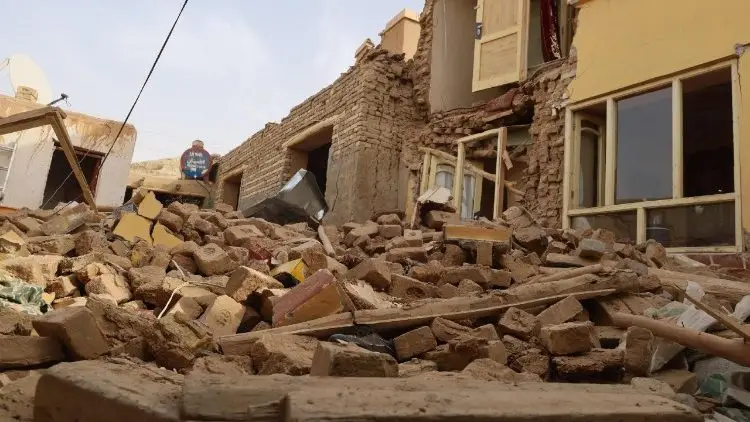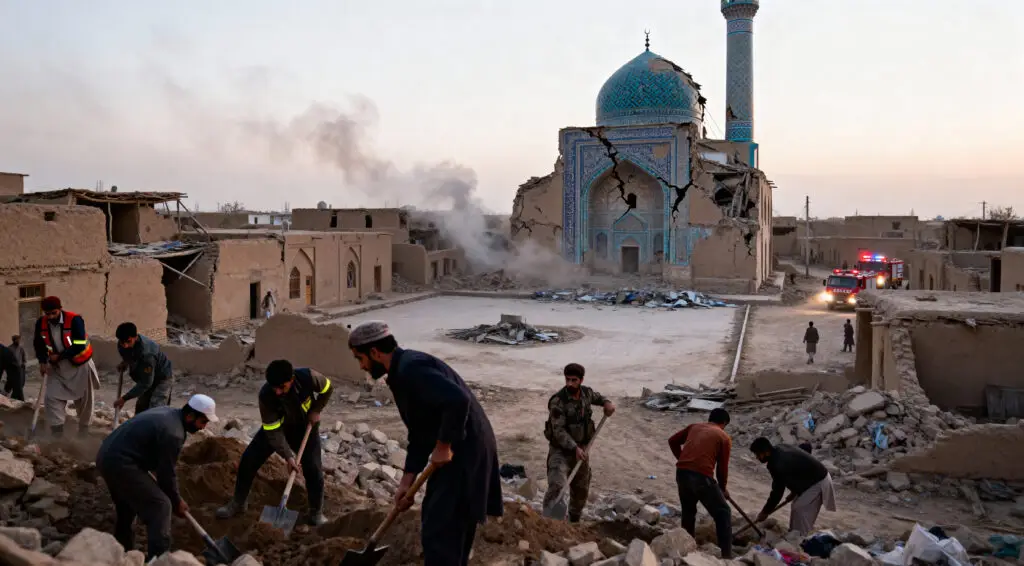Quake Strikes Before Dawn, Leaving Devastation Behind
A strong 6.3 magnitude earthquake hit northern Afghanistan early Monday morning, destroying many buildings and public structures across several provinces. The quake struck shortly before one in the morning, shaking homes and government offices while most residents were still asleep.
Officials confirmed at least twenty deaths and more than six hundred forty injuries, though they warned the toll could rise as rescue teams continue their search. Emergency workers began digging through rubble within hours, rushing victims to nearby hospitals amid widespread panic.

Source: Vatican News
Epicenter Near Khulm Triggers Widespread Structural Damage
The U.S. Geological Survey identified the epicenter twenty-two kilometers west-southwest of Khulm at a depth of twenty-eight kilometers. The hardest-hit areas included Balkh, Samangan, Sar-e-Pul, and Kunduz provinces, where hundreds of mud-brick houses collapsed.
Residents in Khulm described chaotic scenes as they used shovels and bare hands to search for survivors under debris. Clouds of dust filled the air as families wept for missing loved ones, many still trapped beneath the remains of their homes.
Historic Blue Mosque Suffers Damage in Mazar-e-Sharif
The centuries-old Blue Mosque in Mazar-e-Sharif suffered visible cracks and partial wall damage but remained standing. The cultural landmark, known for its blue tiles and ornate domes, is a central symbol of Afghan heritage and faith.
Videos circulating online showed fallen bricks scattered across the courtyard and fractured outer walls. Cultural preservation officials said assessments would begin immediately to stabilize the structure and prevent further deterioration.
Recommended Article: Dinagat Reels as Typhoon Tino Revives Painful Memories of Odette 2021
Authorities Report Hundreds Injured Across Four Provinces
According to the National Disaster Management Authority, twenty people have been confirmed dead and six hundred forty-three injured. Hospitals in Balkh and Samangan reported treating hundreds of patients suffering from fractures, cuts, and head injuries.
Medical centers are struggling to keep up with the rising number of casualties. The Ministry of Health said at least twenty-five critically injured individuals were airlifted to larger facilities while mobile field hospitals were being set up in affected zones.
Rescue Teams Struggle Amid Remote Terrain and Poor Infrastructure
The Ministry of Defense deployed rescue teams to the most devastated districts, but damaged infrastructure has severely slowed their progress. Blocked roads, landslides, and washed-out bridges have made access to rural communities nearly impossible.
In one remote village in Badakhshan Province, about eight hundred homes were either partially or completely destroyed. Limited communication and poor internet connectivity have hindered rescue coordination and made it difficult to assess total losses.
Regional Leaders Express Condolences and Offer Assistance
Pakistan’s President Asif Ali Zardari extended condolences and offered humanitarian aid to Afghanistan, emphasizing solidarity despite political differences. He said that both nations share deep human and cultural ties strengthened in times of crisis.
The United Nations confirmed that its teams are on-site conducting rapid needs assessments. International aid convoys are now delivering food, clean water, and medical supplies while working with Afghan authorities to plan long-term recovery measures.
Afghanistan’s Ongoing Vulnerability to Natural Disasters
The earthquake adds to a recent series of deadly tremors that have struck Afghanistan in the past few years. In August, a magnitude six quake killed over two thousand two hundred people in the eastern region.
Experts warn that Afghanistan remains highly susceptible to seismic disasters due to widespread poverty, fragile infrastructure, and substandard housing. Many structures are built from mud and wood, leaving them unable to withstand even moderate quakes, which amplifies destruction and loss of life each time tragedy strikes.























